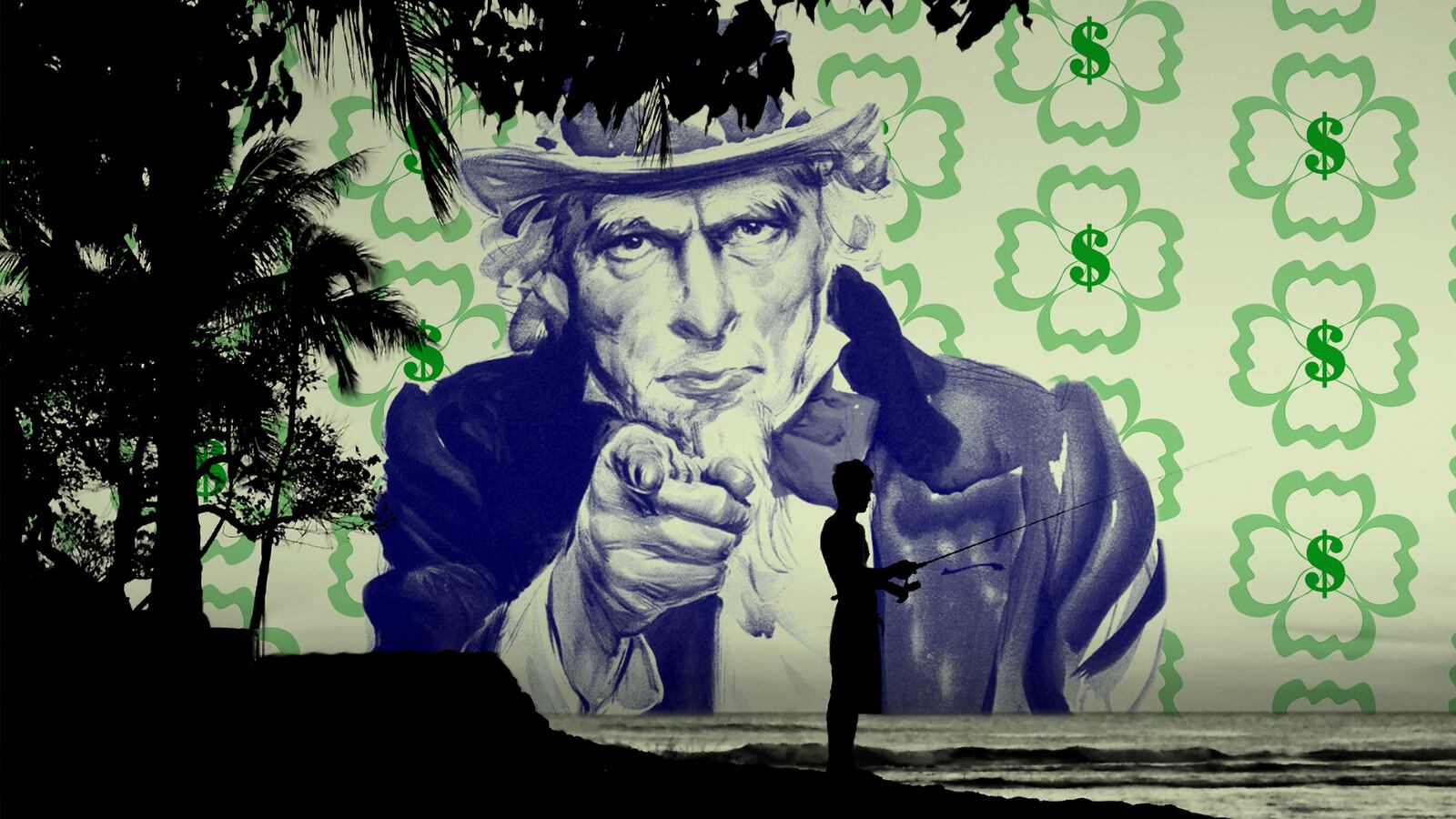A growing movement of defense attorneys, tax dodgers, and legal scholars in Hawaii dismiss their home as the 50th state in the union and instead call it an occupied kingdom. In the past couple years they’ve been daring D.C. to prove them wrong—calling any attempt to collect taxes from them “war crimes” and challenging the feds in courts around the globe.
Take the taxpaying Swiss national, a Hawaiian resident, who wants to withhold his taxes from the state. The Daily Beast isn’t naming him, because he says he fears reprisal. But the Swiss man, a farmer in his mid-40s, is dusting off an 1864 treaty between Switzerland and the Kingdom of Hawaii—to prove that he’s not beholden to Uncle Sam but Queen Lili’uokalani.
Revisionists like the farmer suggest that the Kingdom of Hawaii was brought down in a coup d’état and was never legitimately annexed during the Spanish-American War in 1898. Instead, it’s just occupied or “kidnapped.”
Dr. Keanu Sai, the farmer’s attorney, suggests that the United States and the state Hawaii government are receiving “stolen money” from those who pay them taxes. He believes his client’s case is exposing how America is committing, in his words, “war crimes” by taxing Hawaiians and his Swiss client.
“The monies received through taxation, that’s stolen money. The tax collectors from the state of Hawaii and the federal government under the guise of taxation are pillaging,” Sai told The Daily Beast. (That’s defined, by the Geneva Convention, as “the taking of property contrary to humanitarian law.)
The case was evaluated and then directed by the federal Swiss prosecutor to an appellate judge in the Swiss city of Bellinzona.
A Swiss Consulate employee, who spoke on the condition of anonymity, says the case is an isolated incident and doesn’t represent the rest of the 700 Swiss who call Hawaii home. “This has strictly to do with the Hawaiian Sovereignty movement,” the worker said. “It’s in the courts now in Switzerland, and the government refused to accept the case. They just took it further to a higher court.”
The case comes almost two decades after Lance Larsen thumbed his nose at the United States by chucking his driver’s license and unscrewing his license plate, and replacing them with a massive placard on his Jeep Comanche that cited Hawaiian Civil Code.
He was subsequently handed multiple driving citations, and when he appeared before a judge in court with his attorney, he demanded the prosecutor reveal the Treaty of Annexation that made Hawaii part of the United States.
The strategy failed and he was ultimately dumped into a jail.
The judge sentenced Larsen to 30 days’ confinement; seven of them were in solitary confinement.
When it was over, Larsen sued the Hawaiian Kingdom for failing to protect him during his driving malfeasance. A three-year battle in the Permanent Court of Arbitration in the Hague ensued.
Larsen’s case eventually petered out because the U.S. government refused to join. But toward the end, the respected American Journal of International Law suggested that “the Hawaiian Kingdom was legally obligated to protect Larsen from the United States’ ‘unlawful imposition [over him] of [its] municipal laws’ through its political subdivision, the State of Hawai’i.”
The unnamed Swiss man now seeking tax relief may not do much better in court. Potentially sinking his case is its reliance on a foreclosure lawsuit filed back in 2011 by Kale Kepekaio Gumapac. In that suit, Gumapac claimed he didn’t have to pay his mortgage to Deutsche Bank on his $300,000 Hawaiian plot for which he contests his title in order to get the insurance to kick in, because, as a "Hawaiian subject", he believed the Kingdom of Hawaii as a constitutional monarchy still existed.
But the Gumapac case was quickly dismissed by a judge who said the “fanciful Kingdom of Hawaii theory” failed to provide a reason to stop paying. And the judge noted that other courts in Hawaii “have rejected similar arguments based on the continued sovereignty of the Kingdom of Hawai‘i.”
Sai said the judge in the 2011 case had it wrong. “This case is evidence in the Swiss criminal complaint for Gumapac, because it shows that Deutsche Bank knew of the situation,” he added, “and instead used the State of Hawai‘i Court to seize his property through the war crimes of an unfair trial, the pillaging of his home, and his unlawful arrest when he attempting to protect his home.”
Sai, who served in the U.S. Army as a captain before being honorably discharged in 1994, said it was when he wore the uniform that he began wondering about his citizenship. “I began researching, and it’s a shock,” Sai, who is Keanu Reeves’s cousin, said.
The political scientist pointed out that Reeves’s movies are remarkably similar to Hawaiians reexamining their history.
“The Matrix is a script about Hawaii,” he said. “It’s all made up until you take the red pill. And people here are waking up to this reality that we’ve been brainwashed.”
The Hawaiian Kingdom argument isn’t just being used in tax and mortgage scofflaw cases.
Last November a criminal indictment was handed down against four Molokai fishermen who allegedly hopped aboard a boat belonging to a group of rival fishermen from Oahu.
Floyd Kapuna, Kaiula English, Robin Dudoit, and Albert Dudoit Jr. allegedly menaced the group, snatched their catch, and began scrapping “with the intent to terrorize” their spearfishing competitors.
At the time, Hawaii’s Department of Land and Natural Resources chairman said the incident wouldn’t be tolerated.
But in pretrial proceedings, two of the defendants (save for Floyd Kapuna and Albert Dudoit Jr.) used the Hawaiian Kingdom argument into the criminal proceedings. Sai was even called as an expert witness in the case. He supplied a legal brief titled “The Continuity of the Hawaiian Kingdom,” which seeks to prove why Hawaii is a sovereign state.
“It provides conclusive evidence that the kingdom continues to exist as a country,” he told The Daily Beast. “For the last 20 years the Supreme Court of the state of Hawaii says that if a defendant is challenging the jurisdiction of the state of Hawaii’s courts…the defendants have to provide conclusive evidence that the Hawaiian Kingdom continues to exist.”
Hawaii state circuit court Judge Joseph Cardoza seemed to be on board when he took “judicial notice” to allow the kingdom evidence to be used at trial this summer.
Williamson Chang, a law professor at the University of Hawaii, is also a supporter of the kingdom legal theory. Last September, he wrote a letter to Attorney General Eric Holder claiming that “multiple felonies” that he called “war crimes” were being “committed here in the Hawaiian Islands.”
He went on to challenge Holder. “But if your office is not able to refute the evidence, then this is a matter for the U.S. Pacific Command, being the occupying power, and all the State of Hawai’i officials and employees, as well as I, are compelled to comply with Hawaiian Kingdom law and the law of occupation.”
The Department of Justice did not respond to repeated requests for comment.
Chang told The Daily Beast that the joint resolution between the House and Senate from 1898 that served as the legal precedence for annexation is weak at best and that several senators came out opposing it as a means to grab Hawaii. “The U.S. has never used it,” he said.
Chang, who is writing a book on the Hawaiian occupation titled A Rope of Sand, said he received a form letter from the Department of Justice that read: “Dear Friend, We are going to look into this.”
Secretary of State John Kerry also fielded a similarly charged letter from Office of Hawaiian Affairs CEO Kamana’opono Crabbe on May 5, 2014. In it, the CEO relies on Sai’s tenets and “raised grave concerns,” posing a series of questions to determine if the Kingdom of Hawaii continues to exist under international law.
A State Department official said they never received Crabbe’s letter and added that the Aloha State isn’t going to split from the union anytime soon. “As you are aware, Hawaii is a state within the United States,” the official said.
Editor's note: This article has been amended to clarify court case details.





